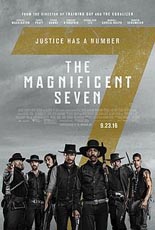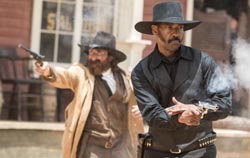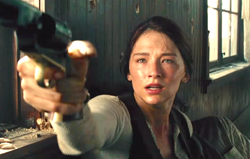
 To put a superlative in the title of your film is asking for trouble. When that film is a remake of a bona fide classic, you’re also inviting trouble in, setting an extra place at the dinner table and prepping the guest room with a set of fresh towels. Such is the problem facing Southpaw director Antoine Fuqua with The Magnificent Seven, his update on the iconic 1960 Western. Given that John Sturges’ “original” is itself a remake of another vaulted treasure of the cinema, Akira Kurosawa’s 1954 epic, Seven Samurai, it’s not a stretch to say Fuqua also has listed trouble as the beneficiary of his life insurance policy.
To put a superlative in the title of your film is asking for trouble. When that film is a remake of a bona fide classic, you’re also inviting trouble in, setting an extra place at the dinner table and prepping the guest room with a set of fresh towels. Such is the problem facing Southpaw director Antoine Fuqua with The Magnificent Seven, his update on the iconic 1960 Western. Given that John Sturges’ “original” is itself a remake of another vaulted treasure of the cinema, Akira Kurosawa’s 1954 epic, Seven Samurai, it’s not a stretch to say Fuqua also has listed trouble as the beneficiary of his life insurance policy.
Following Training Day and The Equalizer, this new Seven marks the third collaboration between Fuqua and leading man Denzel Washington, who more or less has the Yul Brynner role here and certainly has the quiet intensity for it. His Sam Chisolm, “duly sworn warrant officer from Wichita, Kansas,” eels out a living by collecting the rewards on wanted men. Although on the side of justice, when Chisolm accepts the assignment that gets this film’s engine cranking, he does so not out of empathy, but because it pays well. That gig is ridding the one-street town of Rose Creek of the snakelike land-grabber Bartholomew Bogue (Peter Sarsgaard, Black Mass), whose takeover plan includes murdering anyone who dares raise a voice against him, thereby making an immediate widow of freckle-faced Emma Cullen (Haley Bennett, The Girl on the Train).
 It is she who offers Chisolm a literal sack of money to knock Bogue down several pegs. To assist in the highly suicidal mission, Chisolm recruits a cocky gunslinger (Chris Pratt, Jurassic World), a sharpshooter (Ethan Hawke, Sinister), a God-fearing tracker (Vincent D’Onofrio, TV’s Daredevil), a Mexican bandit (Manuel Garcia-Rulfo, TV’s From Dusk Till Dawn: The Series), a knife-wielding Asian (Byung-hun Lee, G.I. Joe: Retaliation) and an arrow-slinging Comanche Indian (Martin Sensmeier, TV’s Westworld).
It is she who offers Chisolm a literal sack of money to knock Bogue down several pegs. To assist in the highly suicidal mission, Chisolm recruits a cocky gunslinger (Chris Pratt, Jurassic World), a sharpshooter (Ethan Hawke, Sinister), a God-fearing tracker (Vincent D’Onofrio, TV’s Daredevil), a Mexican bandit (Manuel Garcia-Rulfo, TV’s From Dusk Till Dawn: The Series), a knife-wielding Asian (Byung-hun Lee, G.I. Joe: Retaliation) and an arrow-slinging Comanche Indian (Martin Sensmeier, TV’s Westworld).
The band-assembly process consumes the film’s first act, with the second devoted to planning for Bogue’s siege, and the third, naturally, depicting said siege. The Magnificent Seven starts fine and just gets better and better as it goes along, finally reaching that lofty adjective of its title. The siege of Rose Creek is an all-out battle of bullets and bombs, and it makes for an invigorating extended set piece of action cinema. Because, by that first-shot-fired point, the individual members of Team Seven have come to care for one another (or what passes for it in such a heteronormative genre that lionizes the he-man), so do we, setting high dramatic stakes.
 As old as storytelling itself, the plot of revenge — especially one that pits the powerless against the powerful — is so primal, so universal, it does not take much work to get audiences all in on the protagonists’ side. Fuqua and his screenwriters Richard Wenk (The Expendables 2) and Nic Pizzolatto (TV’s True Detective), could have coasted on that, but they are too smart to squander the opportunity of painting this blockbuster canvas. While the movie is guilty of several points of cliché, it continually surprises. Bennett’s headstrong Cullen is such a vital link in the chain, she practically makes the case for adding a one to the name. Stealing scenes and earning laughs is not Pratt, but D’Onofrio, in an out-there performance that somehow works as an emotional anchor. Washington enjoys the best of both worlds, in that he not only radiates the good-guydom of a genuine movie star (right from his John Wayne entrance), but gets to exercise his considerable acting chops, most notably exhorting Bogue to pray.
As old as storytelling itself, the plot of revenge — especially one that pits the powerless against the powerful — is so primal, so universal, it does not take much work to get audiences all in on the protagonists’ side. Fuqua and his screenwriters Richard Wenk (The Expendables 2) and Nic Pizzolatto (TV’s True Detective), could have coasted on that, but they are too smart to squander the opportunity of painting this blockbuster canvas. While the movie is guilty of several points of cliché, it continually surprises. Bennett’s headstrong Cullen is such a vital link in the chain, she practically makes the case for adding a one to the name. Stealing scenes and earning laughs is not Pratt, but D’Onofrio, in an out-there performance that somehow works as an emotional anchor. Washington enjoys the best of both worlds, in that he not only radiates the good-guydom of a genuine movie star (right from his John Wayne entrance), but gets to exercise his considerable acting chops, most notably exhorting Bogue to pray.
Imbued with mythicism and emboldened by its multicultural cast, The Magnificent Seven breathes new life into the Western while also sticking closely to its old template: same bones, just different meat. We are denied hearing Elmer Bernstein’s Oscar-nominated theme from the ’60 Seven until the end credits begin, as if Fuqua was waiting until he felt he had earned the right to play it. Once that forever-rousing number kicks in, you agree that he has, because you still can feel the rush held over from the previous scenes. —Rod Lott
